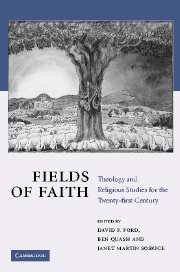13 - Fields of faith: an experiment in the study of theology and the religions
Published online by Cambridge University Press: 22 September 2009
Summary
INTRODUCTION
In the opening chapter of The Beginning and the End of ‘Religion’, Nicholas Lash draws an analogy between (on the one hand) the academic thinker in the field of the study of theology and the religions, and (on the other) the figure of Arjuna in the thirteenth chapter of the Bhagavadgita, who finds himself in the middle of a field of battle, and who (with the help of Krishna) must try to find his way upon it: ‘It is always on the field of battle, in the midst of action, that we are challenged to consider and to clarify, to cleanse the mind and heart and purify the springs of action.’ He also remarks that the field, or context of reflection, for any academic thinker will vary in an immense number of ways. Some of these variations will be obvious; some very subtle. Each person's context of thought and activity will have features that are entirely particular to it, because all our thought and activity is thought and activity that ‘we do from somewhere, shaped by some set of memories and expectations, bearing some sense of duty borne and gifts that have been given. All sense, and truth, and goodness, are carried and constituted by some story, some pattern of experience, some tradition.’
- Type
- Chapter
- Information
- Fields of FaithTheology and Religious Studies for the Twenty-first Century, pp. 207 - 221Publisher: Cambridge University PressPrint publication year: 2005



